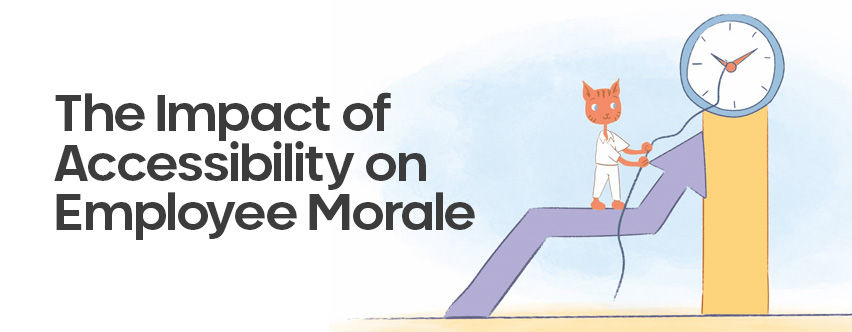In today’s rapidly evolving work landscape, ensuring a diverse and inclusive environment isn’t just a moral obligation; it’s also a smart business move. One often overlooked aspect of this inclusivity is accessibility. The question we’re addressing here is: Does accessibility impact employee morale? Let’s delve into this vital topic and explore its significance for both employees and businesses.
Table of Contents
Understanding Accessibility:
Accessibility refers to the design of products, services, and environments that can be used by individuals with diverse abilities, including those with disabilities. This encompasses physical spaces, digital platforms, and more. When a workplace embraces accessibility, it shows a commitment to valuing every employee and creating an environment where everyone can thrive.
The Link to Morale:
Employee morale is a critical factor in productivity, job satisfaction, and overall organizational success. By optimizing your workspace for accessibility, you’re not just meeting legal requirements; you’re also fostering a positive work environment that can significantly impact employee morale. When employees feel that their needs are considered and accommodated, their job satisfaction and sense of belonging increase.
Comparison Table:
| Aspect | Non-Accessible Workplace | Accessible Workplace |
|---|---|---|
| Morale | Often lower due to exclusion | Higher due to inclusion |
| Productivity | Affected by discomfort | Enhanced due to comfort |
| Collaboration | Hindered by communication barriers | Improved communication |
| Innovation | Limited due to lack of diverse perspectives | Promoted through inclusivity |
Statistics:
- According to a study by the Society for Human Resource Management (SHRM), 84% of job applicants say that a company’s reputation for diversity and inclusion is crucial in their decision to apply.
- A survey conducted by Accenture found that 29% of employees believed that accessibility and workplace accommodations had a positive impact on their productivity.
FAQ:
Q: What are some common accessibility measures?
A: Common measures include providing wheelchair ramps, offering screen readers and closed captioning for digital content, adjustable workstations, and clear communication channels.
Q: Does accessibility only benefit employees with disabilities?
A: No, accessibility improvements often benefit everyone. For instance, curb cuts installed for wheelchair users are also appreciated by parents with strollers or people using bicycles.
Q: Is accessibility expensive to implement?
A: While there might be initial costs, accessibility investments are often cost-effective in the long run. They can lead to higher employee retention, increased productivity, and an improved company image.
In conclusion, accessibility does indeed impact employee morale. When businesses prioritize accessibility, they create an environment where all employees feel valued and empowered. This not only enhances morale but also contributes to a more inclusive, innovative, and successful workplace. As workplaces continue to evolve, embracing accessibility isn’t just a choice – it’s a necessity for a brighter and more inclusive future.


Leave a Reply